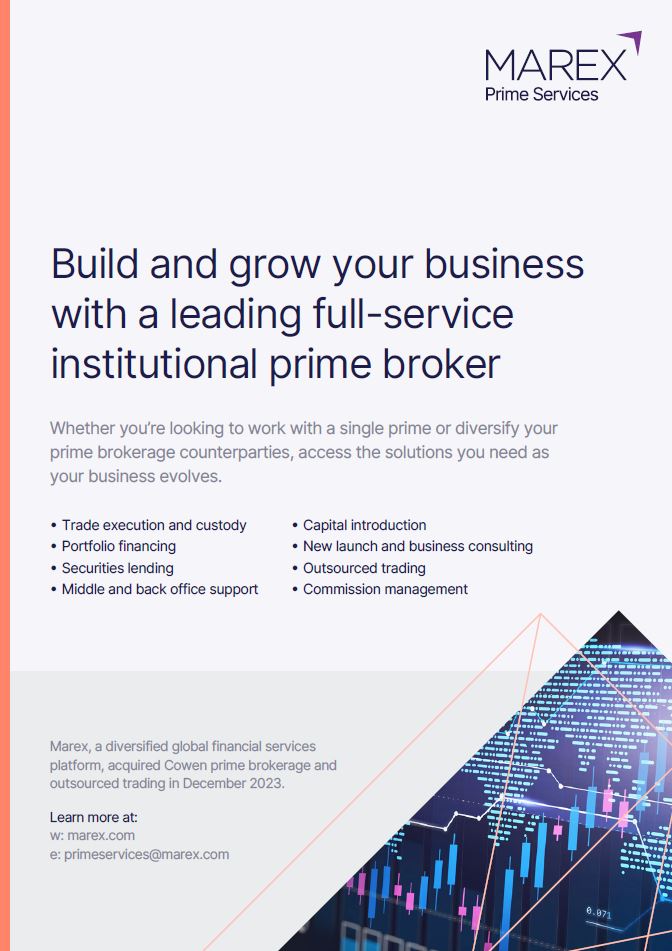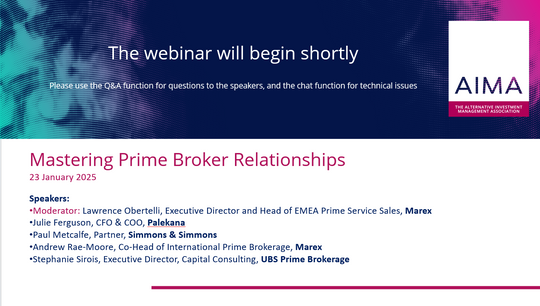Starting a new fund: 5 thoughts on making the big leap
By Ortwin Gierhake, Marex Prime Services
Published: 18 March 2024
Making the transition from being a fund management star to running an asset management business is exciting but it can be fraught with pitfalls. To stand the best chance of success, you not only need a great track record in outperforming in both bull and bear markets, but also expertise in a wide range of other areas, including business planning, raising capital, accounting and HR. This may sound daunting but help is at hand to support you every step of the way.
Having spent over a decade helping funds to get off to a successful start – and supporting them on their growth journey – Ortwin Gierhake, Marex Prime Services is well placed to advise fund managers on making the big leap. Here he shares his top five tips for fund managers starting a new fund.
1. Take a cold, hard look at who would be the right CEO
If you’re a successful fund manager, it’s easy to imagine running your own hedge fund. The question is, are you actually able to? Many people in that situation will have only run very small teams, with a few assistants. Suddenly, you have an actual business to look after, which means you’re outside of your comfort zone.
For me, the CEO is key. The person needs to have the right blend of skills and experience. Too often, when a fund is formed, the initial team will pick someone from their own ranks to run it based on whatever is most expedient. If need be, consider a new face, someone external to the start-up team.
2. Think in terms of an elevator pitch
Often, someone who has little or no experience running a business does not understand the importance of crystalising their strategy in a tight 30-second statement. If you can begin to do that – and not ramble –that is progress. As you move into marketing, if you don’t have an elevator pitch, it becomes immediately apparent.
Your fund does not need to be unique. In fact, when I hear people say they have something totally unique, I begin to worry. They are either unaware of industry dynamics or they could be making promises they won’t be able to keep. You just must have something that makes a lot of sense.
3. Understand the value of independence
The boss should make decisions purely on evidence, not based on prior relationships. I’ve seen situations where the compliance officer or the risk officer is related to the CIO. How is that supposed to work?
If a fund wants to manage its own money, or the money of friends and family, then cosy relationships like that may work. But if you want to get bigger, you need to take on a more professional approach from Day 1. An institutional investor looking at your operation will expect to see that.
4. Focus on team dynamics
Managing the team is a critical function. Far too often, new funds begin to fray because individual managers have created their own realities, with too many yes people who were unprepared to push back. It’s vital to have someone running the fund who understands how to create the right team dynamic, to cut through the noise and focus on what matters.
There are so many potential ways that stress can enter the scene in the first 12-24 months. A fund CEO needs to have an eye on all of that, getting people to keep talking to each other and being open. Allocators will be able to sense if the team is not functioning well.
5. Be organised right from the start
Funds have a brief window of opportunity when they are launching. They need to use the time wisely. At the beginning, we often see funds get overwhelmed. They go to conferences and collect cards and feedback, but they don’t take notes and categorise them. After a month, they have lots of leads, but they don’t know which are hot, cold, or worth forgetting. It is imperative to have somebody who takes initial inquiries, answers the easy questions, and ensures that investor leads are handled correctly. This doesn’t necessarily need to be Investor Relations person, but it needs to be someone who is allocated these responsibilities as part of their remit.
You can’t do justice to a subject as nuanced and complex as this in just a few short tips. However, be mindful that a supportive prime brokerage partner can bring a wealth of expertise. Successful funds need more than great trading ideas. They need great business leaders. That kind of greatness can be learned, with the right helping hand.







